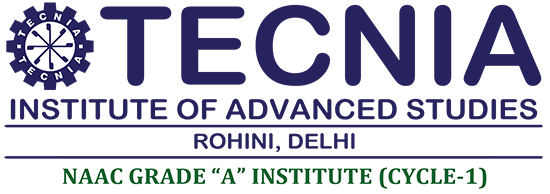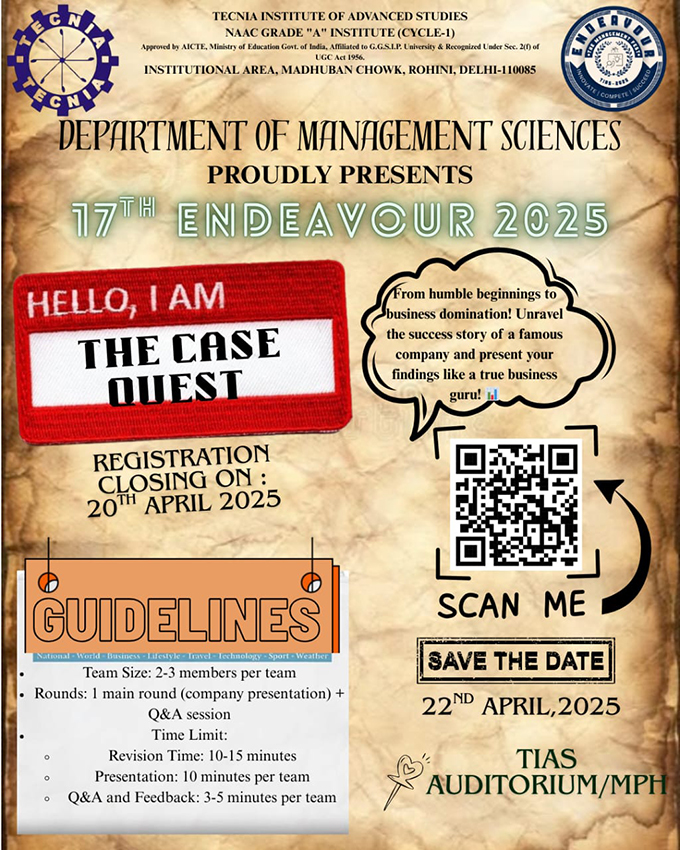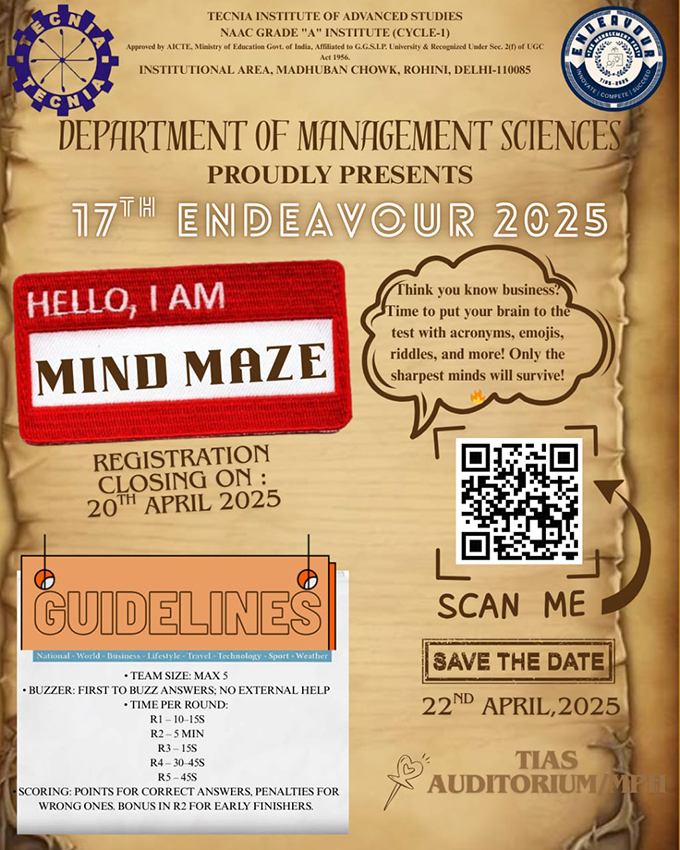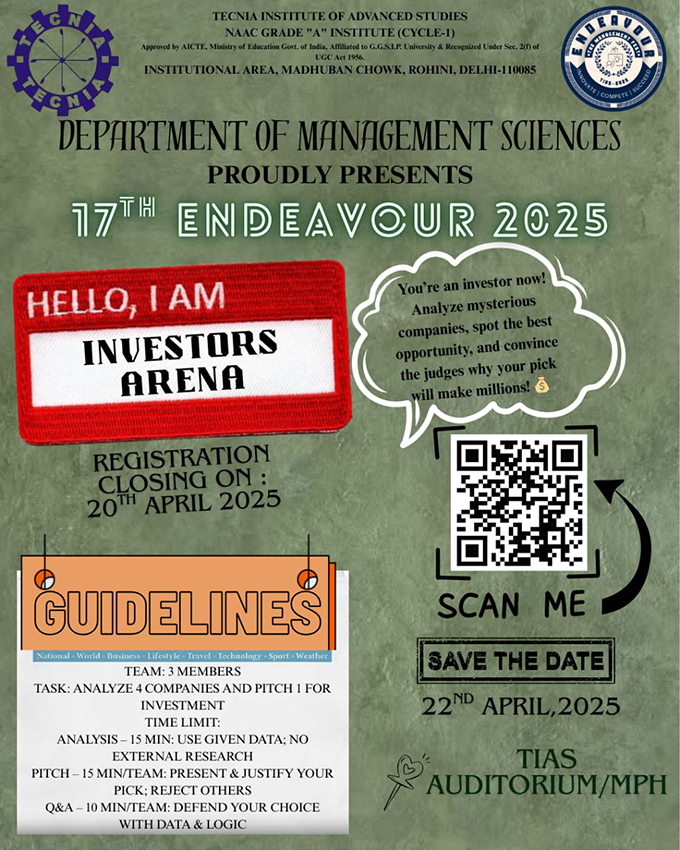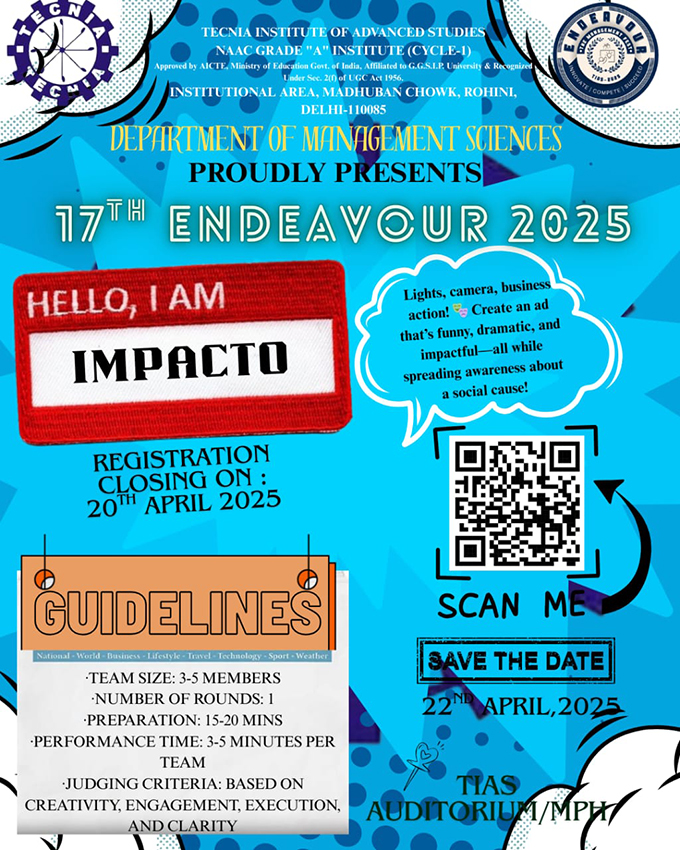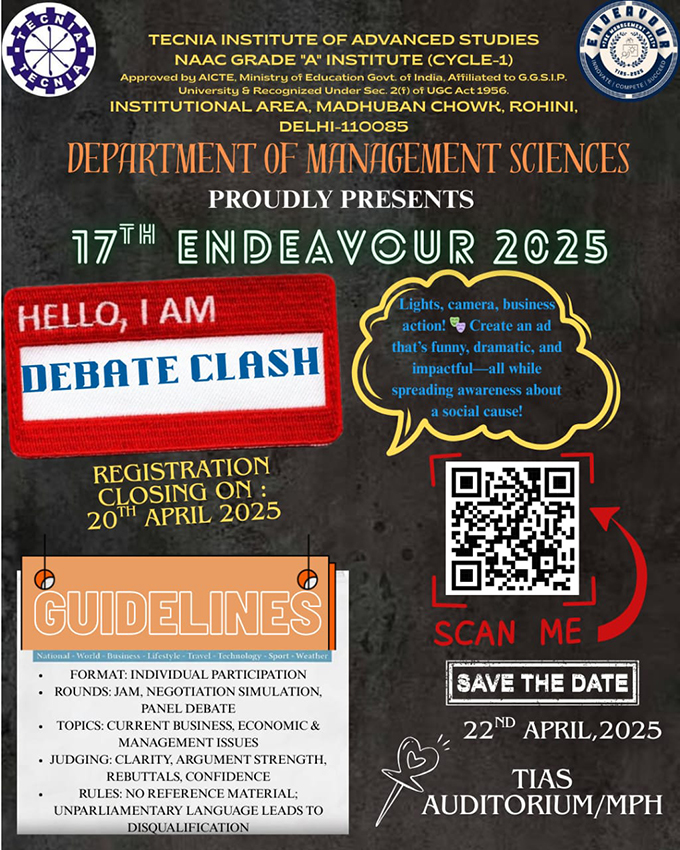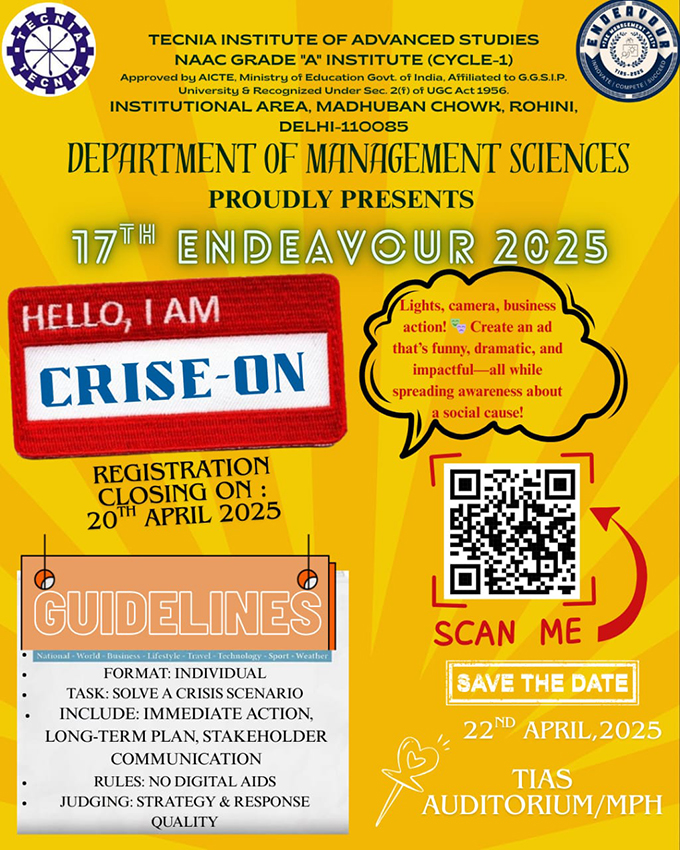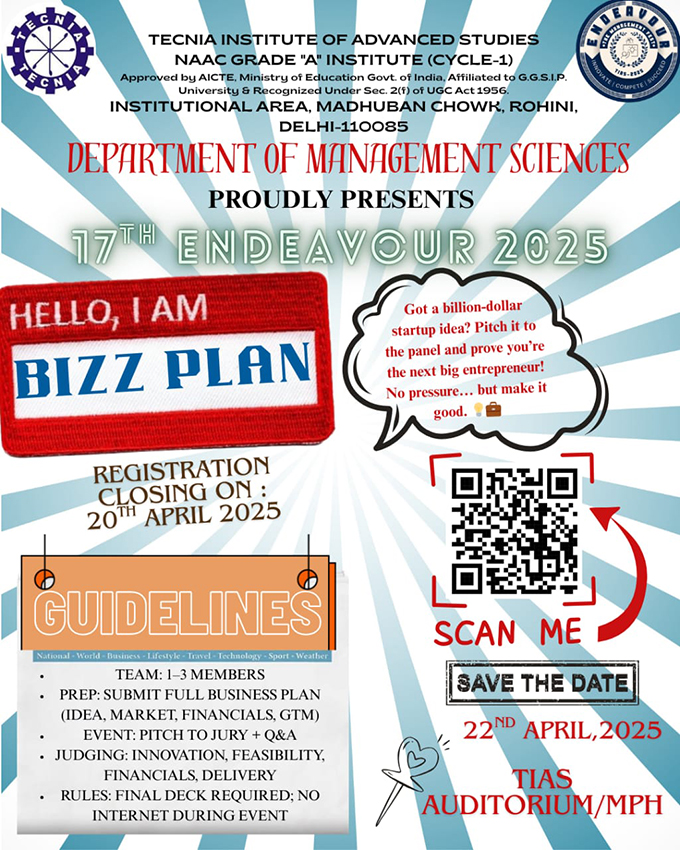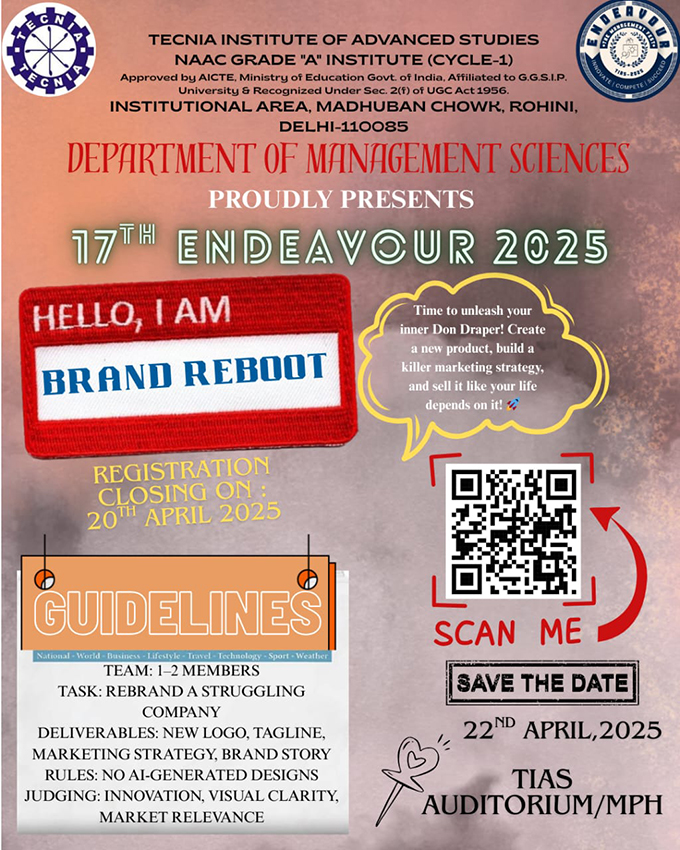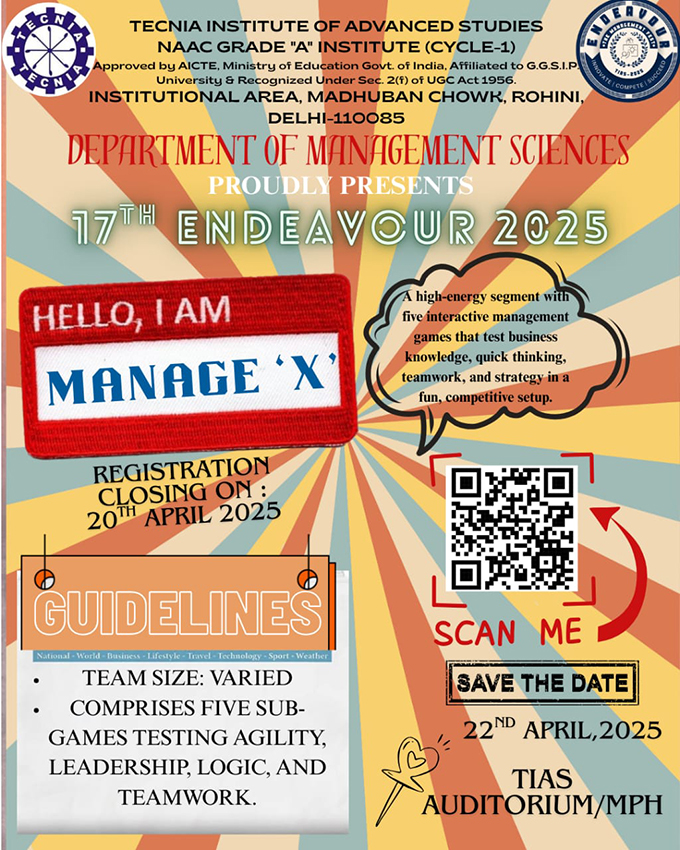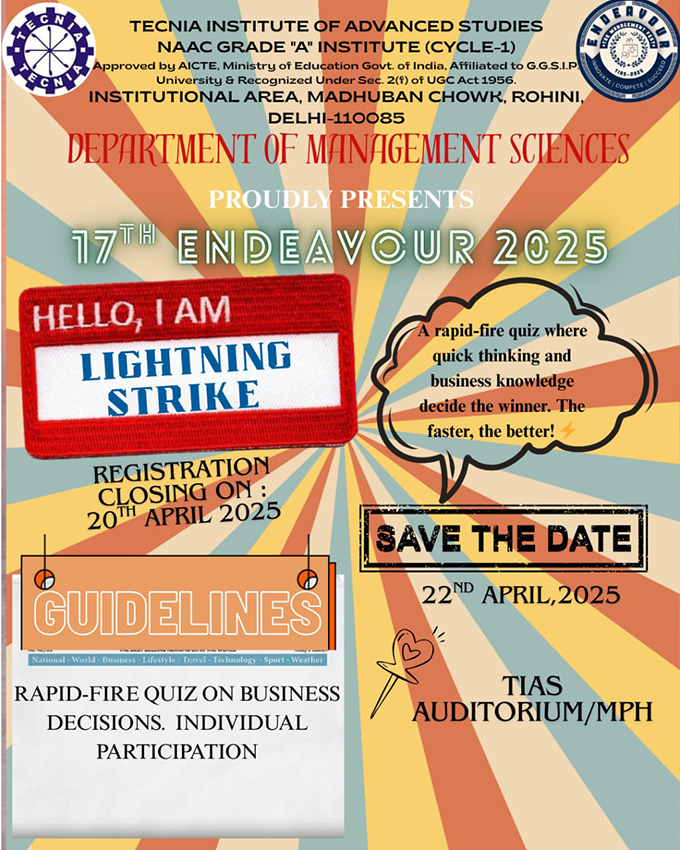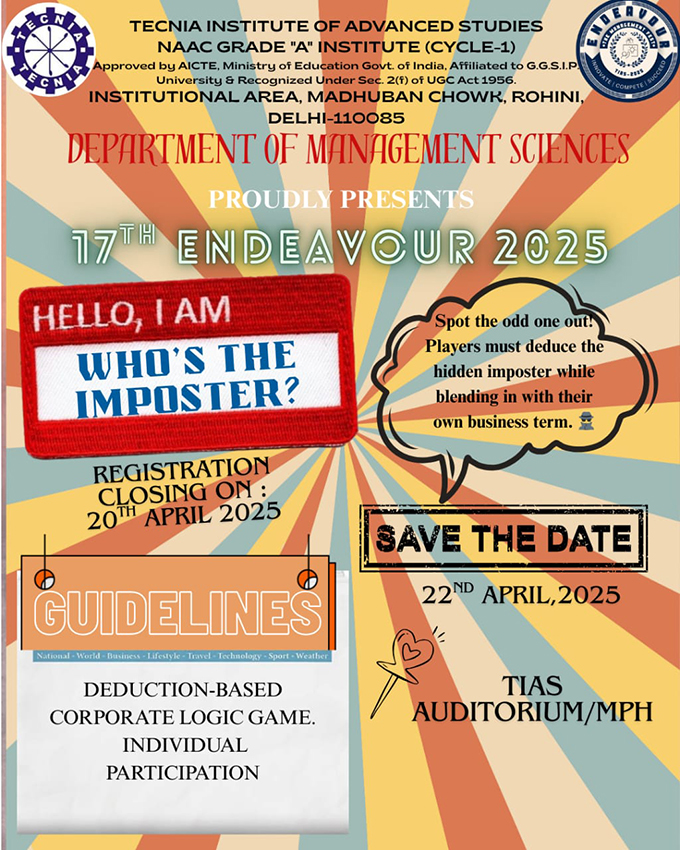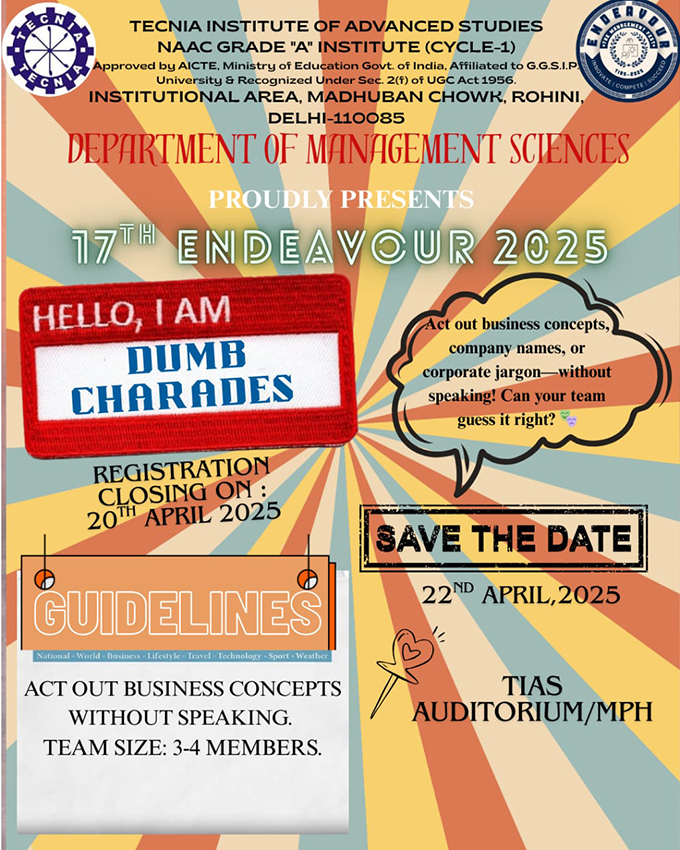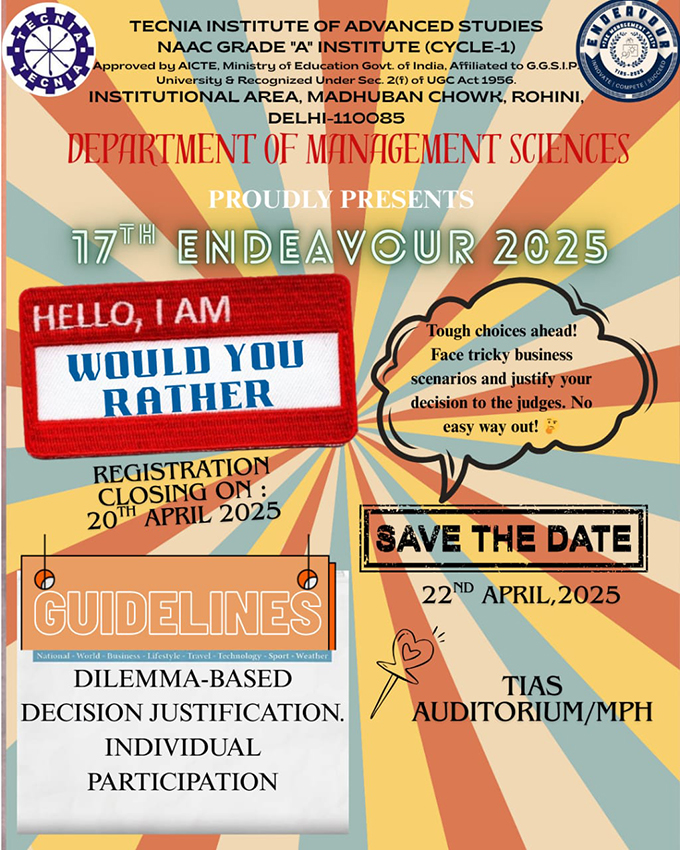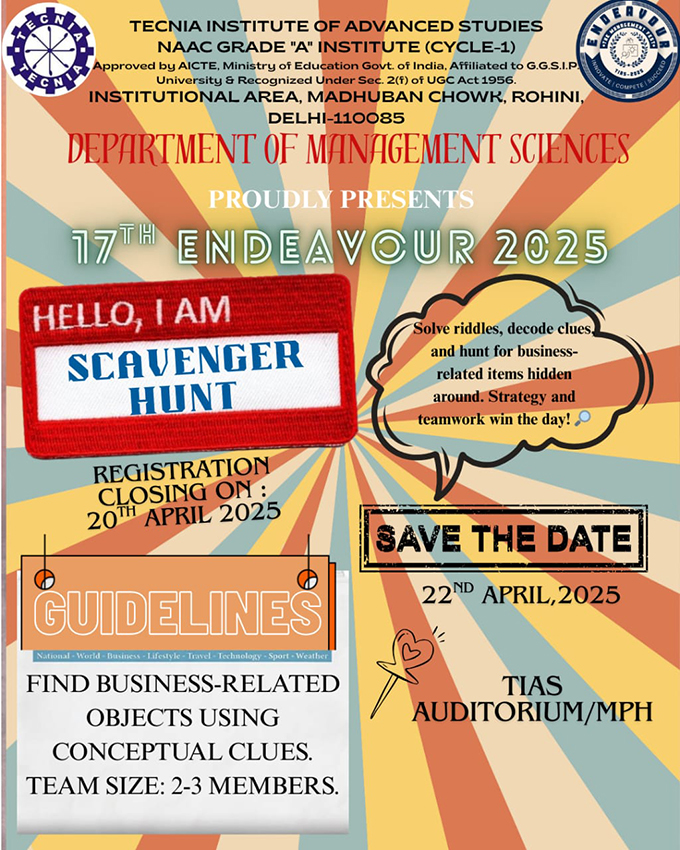
- INTRODUCTION
- OBJECTIVES
- ORGANIZING COMMITTEE
- EVENT DETAILS
- EVENT SCHEDULE
- MIND MAZE
- INVESTORS ARENA
- SCAVENGER HUNT
- THE CASE QUEST
- LIGHTNING STRIKE
- IMPACTO
- DEBATE CLASH
- CRISE ON
- BIZZ PLAN
- TRADE MARK-BRAND REBOOT
- RULE & REGULATIONS
- Events
Introduction
Endeavour is a flagship event organized by Tecnia Institute of Advanced Studies. It provides a vibrant platform for students from diverse backgrounds to exhibit their knowledge, skills, and potential. The essence of Endeavour lies in recognizing those who demonstrate determination, courage, and the will to thrive—even in challenging situations. The participants who effectively balance emotional intelligence with intellectual capabilities will emerge as true winners. It serves as a remarkable opportunity for students to display their managerial acumen and multifaceted talents.
Building on this spirit, TIAS proudly continues the legacy by hosting “Endeavour – Management Fest” on campus. This event brings together a series of management-focused activities that celebrate the diverse interests, strengths, and unique skills of the student community.
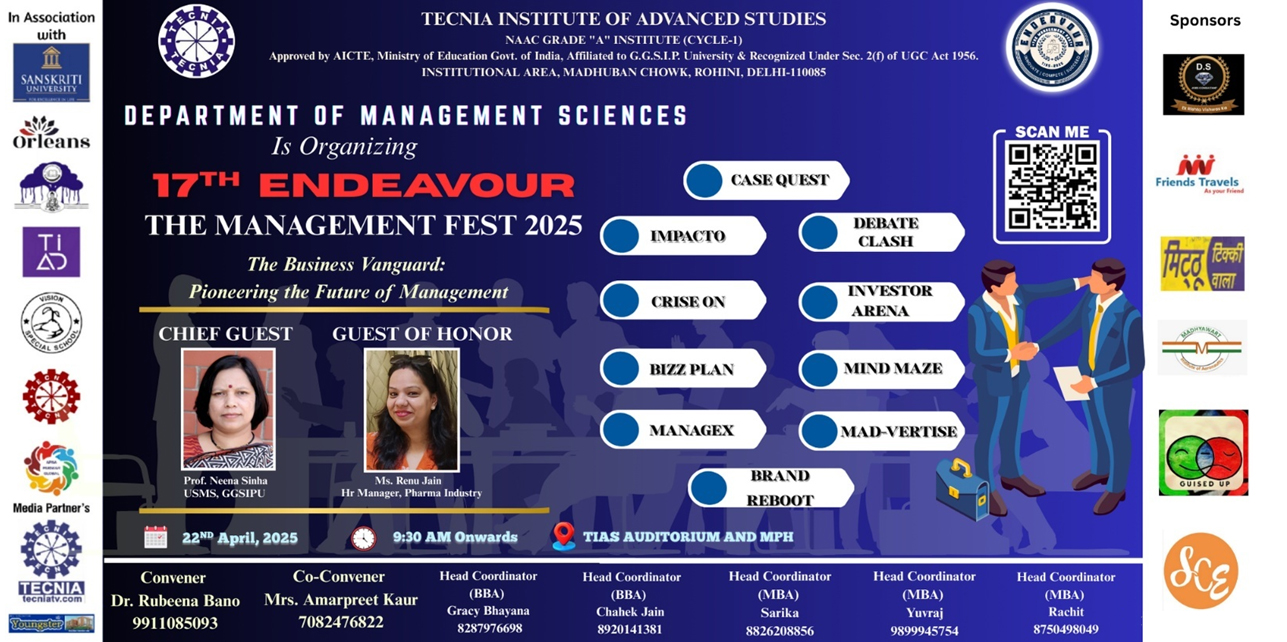
Objectives
- Encourage creative thinking and broaden perspectives.
- Strengthen students’ analytical and problem-solving skills.
- Develop the ability to make quick and effective decisions.
- Expose students to innovative promotional techniques.
- Foster originality and imagination in marketing.
- Promote critical thinking on contemporary issues.
- Enhance communication skills and verbal interactions.
Organizing Committee
- DirectorProf. (Dr.) Ajay Kumar, Director
- DeanDr. M.N. Jha
- ConvenerDr. Rubeena Bano
- Co-ConvenerMrs. Amarpreet Kaur
SCHEDULE
|
Introduction
A brain-teasing business quiz designed to challenge participants on their knowledge of the corporate world. This activity merges mental agility with business literacy, testing how well individuals can navigate through layered logic, hidden clues, and conceptual questions. It’s more than just a quiz—it’s a maze of intellect and insight.
DESCRIPTION
To challenge participants on their business knowledge, reasoning, speed, and creativity through five distinct rounds, featuring acronyms, grid puzzles, emoji decoding, riddles, and tongue twisters
GENERAL GUIDELINES (BUSINESS BRAIN MAZE):
- Team size: 1–2 members.
- Format: Multi-round quiz featuring logic puzzles, corporate riddles, business trivia, and decoding challenges.
- No mobile phones or internet access during the quiz.
- Each round is time-bound and elimination-based.
- Evaluation based on accuracy, logical reasoning, and response time.
BUZZER SYSTEM:
- The first team to press the buzzer gets to answer.
- If incorrect, the next team to buzz gets a chance.
- No external help (internet, phones, or notes) is allowed.
TIME LIMITS:
- Round 1: 10-15 seconds per acronym.
- Round 2: 5 minutes for the grid puzzle.
- Round 3: 15 seconds per emoji set.
- Round 4: 30-45 seconds per riddle.
- Round 5: 45 seconds per tongue twister.
SCORING:
- Correct answers earn points, while incorrect answers result in deductions (except in specific rounds).
- Bonus points awarded in Round 2 based on submission sequence
Introduction
A strategic role-reversal simulation inspired by Shark Tank, where participants become investors rather than entrepreneurs. They are presented with unique startup ideas and must analyze business potential, profitability, and market viability. But here’s the twist—they pitch themselves to the startup, justifying why they’re the best fit as investors. It’s a game of persuasion, negotiation, and sharp financial judgment that highlights participants’ understanding of business dynamics and investment strategies.
DESCRIPTION
Participants will take on the role of investors and analyze four lesser-known companies. They must evaluate key aspects such as business models, financial stability, and growth potential. The goal is to select one company for investment and justify why it is the best choice while explaining why the other three were rejected.
COMPETITION FORMAT
- Team size: 1–2 members.
- Each team consists of 3 members.
- Teams will collaboratively assess the provided companies and present their investment decision.
Part 1: Company Analysis (15 minutes)
- Each team will receive detailed profiles of four companies.
- Teams will assess the companies based on market potential, financial health, competitive.
Part 2: Investment Pitch & Justification (15 minutes per team)
- Teams must present their chosen company for investment, explaining:
- Teams must also justify why they are NOT investing in the other three companies.
Part 3: Q&A with Judges (10 minutes per team)
- Judges will challenge teams by asking critical questions about their investment decision.
- Teams must defend their choice with strong reasoning, logical analysis, and financial insights.
RULES & REGULATIONS
- Team size: 2-3 members.
- Participants act as investors.
- Presented with fictional startup profiles; must analyze business model, scalability, and market potential.
- Teams pitch themselves to startups, justifying why they’re the right investors.
- Judged on analytical skills, financial judgment, negotiation strength, and persuasive delivery.
Introduction
A hunt filled with clues based on business concepts, management themes, and logical puzzles. It requires fast thinking, team coordination, and an applied understanding of theoretical knowledge in real-time action.
DESCRIPTION
“The Ultimate Marketing Quest” is an educational scavenger hunt designed to reinforce key marketing concepts through a structured clue-based format. Participating teams navigate unique clue trails across campus, interpreting marketing-themed riddles that guide them through various academic locations. The game promotes applied learning, strategic thinking, and collaboration in an engaging and interactive manner
GUIDELINES
- Team Structure:
- Participants will compete in pre-assigned teams.
- Each team must stay together throughout the hunt.
- Starting Point:
- All teams will begin the hunt at the same location with the first common clue.
- After the first clue, each team will follow its own unique trail of clues.
- Clue Format:
- Clues are riddle-based and themed around core marketing concepts.
- Each clue will lead the team to a specific location within the campus.
- No Tasks Involved
- This is a pure clue-solving game. There are no tasks or challenges at the clue points.
- Teams must simply solve the clue and proceed to the next location.
- Time Limit
- Teams are expected to complete their trail within the given time limit.
- Rules of Conduct:
- No use of mobile phones or internet for solving clues.
- Teams must not interfere with other teams or their clue trails.
- Respect all campus property and maintain discipline at all times.
- Marketing Pitch (Bonus Round):
- After completing the hunt, each team will give a brief 1-2 minute marketing pitch for a new product based on their social media.
- No fixed answer, result will be based on clarity, creativity and content.
Introduction
A brain-teasing business quiz designed to challenge participants on their knowledge of the corporate world. This activity merges mental agility with business literacy, testing how well individuals can navigate through layered logic, hidden clues, and conceptual questions. It’s more than just a quiz—it’s a maze of intellect and insight.
DESCRIPTION
A presentation-based competition where teams research and showcase a real-world company’s transformation from a startup to a market leader. This challenge enhances storytelling, strategic analysis, and presentation skills.
TIME REQUIRED (EACH TEAM):
20-30 mins
GAME FORMAT:
- Team Size: 1-2 members
- Rounds: 1 main round (company presentation) + Q&A session
- Time Limit:
- Revision Time: 10-15 minutes
- Presentation: 10 minutes per team
- Q&A and Feedback: 3-5 minutes per team
- How It Works:
- Pre-Event Preparation: Each participant researches a real-world entrepreneurial success story.
- Revision Time: On the event day, teams get 10-15 minutes for final adjustments.
- Company Presentation: Teams deliver a structured presentation covering:
- Presentation: 10 minutes per team
- Q&A and Feedback: 3-5 minutes per team
- Basic Guidelines
- Team size: 1–2 members.
- Pre-event preparation required: Each participant researches a real-world entrepreneurial success story.
- Presentation includes company history, strategic pivots, leadership insights, and key takeaways (participants may bring presentation from home).
- Judges evaluate narrative, structure, analytical insights, and clarity.
- Strict time limit.
- No plagiarism tolerated; originality is critical.
Introduction
A lightning-fast quiz round that evaluates how quickly participants can make informed business decisions. It’s not just about speed—it’s about presence of mind, confidence, and the ability to trust your instincts in a business context.
DESCRIPTION
A presentation-based competition where teams research and showcase a real-world company’s transformation from a startup to a market leader. This challenge enhances storytelling, strategic analysis, and presentation skills.
TIME REQUIRED (EACH TEAM):
20-30 mins
GAME FORMAT:
- Team Size: 1-2 members
- Rounds: 1 main round (company presentation) + Q&A session
- Time Limit:
- Revision Time: 10-15 minutes
- Presentation: 10 minutes per team
- Q&A and Feedback: 3-5 minutes per team
- How It Works:
- Pre-Event Preparation: Each participant researches a real-world entrepreneurial success story.
- Revision Time: On the event day, teams get 10-15 minutes for final adjustments.
- Company Presentation: Teams deliver a structured presentation covering:
- Presentation: 10 minutes per team
- Q&A and Feedback: 3-5 minutes per team
- Basic Guidelines
- Team size: 1–2 members.
- Pre-event preparation required: Each participant researches a real-world entrepreneurial success story.
- Presentation includes company history, strategic pivots, leadership insights, and key takeaways (participants may bring presentation from home).
- Judges evaluate narrative, structure, analytical insights, and clarity.
- Strict time limit.
- No plagiarism tolerated; originality is critical.
Introduction
A powerful platform for social storytelling where participants use drama and performance to raise awareness about pressing social issues. The skit format enables teams to blend emotion, creativity, and social consciousness while highlighting causes such as mental health, gender equality, environmental protection, or poverty. It fosters empathy, teamwork, and presentation skills while reminding us of the social responsibilities business leaders carry.
DESCRIPTION
This competition is a celebration of creativity with a conscience! Teams are challenged to craft and perform original, clever, and captivating advertisements that spotlight a meaningful social cause. The objective is to harness the power of humour, emotion, and imagination to deliver a message that resonates deeply with both the audience and the judges. Whether through satire, storytelling, or striking innovation, participants must leave a lasting impression—one that entertains, enlightens, and inspires action.
GUIDELINES
- Performance Format:
- The ad can be a skit, jingle, commercial-style act, or any creative presentation.
- Use of props and background music is allowed but must be arranged by the team.
- Judging & Scoring: A panel of judges will evaluate each performance based on predefined criteria.
Time Limit: Exceeding the allotted 5-minute limit will result in a penalty in scoring.
- Fair Play Rules:
- No Offensive Content: Ads must be appropriate, respectful, and free from any political, religious, or sensitive content.
- Team Coordination: Every team member must participate in some way.
- No Plagiarism: The advertisement must be original and not copied from existing ads.
- No External Assistance: Teams cannot seek professional help or external scripts.
- Silent Audience: No interruptions from other teams during a performance.
Introduction
A competitive yet intellectual platform where participants go head-to-head in structured debates centered around business, economics, or management themes. Whether it’s sustainability, ethical leadership, AI in business, or globalization, participants must showcase their ability to construct logical arguments, counter opposing views, and articulate insights with confidence. This activity sharpen analytical skills, oratory power, and business acumen under pressure
DESCRIPTION
A three-round debate-based competition where participants showcase their quick thinking, negotiation skills, and strategic argumentation. Each round eliminates weaker performers, culminating in a final panel debate among the best contenders.
TIME REQUIRED:
60-90 mins
ROUND 1: JUST A MINUTE (JAM)
Objective: To test participants’ ability to speak fluently and coherently on a given business-related topic within one minute.
- Game Format:
- Participants: Individual participation
- Time Limit: 1 minute per participant
- Elimination: Top performers advance; bottom-ranked participants are eliminated.
- How It Works:
- Topic Assignment: Each participant gets a business-related topic (e.g., “Is AI a threat to jobs?”, “The future of cryptocurrency”).
- Speaking Challenge: Participants must speak for exactly one minute without hesitation, repetition, or deviation.
- Judging & Elimination: Judges score based on fluency, relevance, and argument strength. The lowest-scoring participants are eliminated.
ROUND 2: NEGOTIATOR SHOWDOWN
Objective: To test participants’ ability to negotiate effectively in a business scenario.
- Game Format:
- Participants: Pairs (1 vs 1 negotiations)
- Time Limit: 10 minutes per negotiation
- Elimination: Winners of negotiations move forward; losing participants are eliminated.
- How It Works:
- Scenario Assignment: Each pair receives a negotiation scenario (e.g., salary negotiation, investment deal, business acquisition).
- Negotiation Phase: Participants engage in live negotiation, aiming to reach the best possible deal.
- Judging & Elimination: Judges assess strategy, persuasion, and deal effectiveness. The best negotiators proceed to the final round.
ROUND 3: THE FINAL PANEL DEBATE
Objective: To engage in a high-level panel discussion where finalists debate a complex business issue.
- Game Format:
- Participants: Finalists from Round 2
- Time Limit: 20-30 minutes (moderated discussion)
- Elimination: Judges determine the overall winner based on performance.
- How It Works:
- Debate Topic Announcement: A complex business or ethical dilemma is given (e.g., “Should companies prioritize sustainability over profit?”).
- Panel Discussion: Finalists engage in an interactive debate, responding to counterpoints and moderator questions.
- Judging & Winner Declaration: Judges evaluate arguments, rebuttals, and communication skills to crown the ultimate business debater.
GENERAL GUIDELINES
- Participants must adhere to time limits strictly.
- No external help (notes, internet) is allowed.
- Judges’ decisions are final and binding.
- Professional and respectful conduct is mandatory.
Introduction
A high-pressure crisis simulation that places participants in the shoes of top-level managers responding to a corporate disaster or PR nightmare. From data breaches to product failures or social backlash, teams must think fast, assign roles, develop a response strategy, and execute under stress. It’s an immersive experience that builds leadership, crisis communication, stakeholder management, and ethical decision-making—all within a controlled yet chaotic business scenario.
DESCRIPTION
A high-stakes crisis management challenge where teams navigate real-world business crises under pressure. With each round, difficulty increases, and weaker teams are eliminated until the top team remains.
TIME REQUIRED:
60-90 mins
ROUND 1: JUST A MINUTE (JAM)
Objective: To test participants’ ability to speak fluently and coherently on a given business-related topic within one minute.
- Game Format:
- Team Size: Solo
- Rounds: 3 elimination rounds, increasing in difficulty
- Time Limit:
- Preparation: 5-10 minutes per round
- Crisis Response Presentation: 3-5 minutes per team
- Q&A from Judges: 2-3 minutes
- How It Works:
- Scenario Assignment: Each round presents teams with a crisis that must be addressed using strategic management skills.
- Preparation Phase: Teams develop a crisis response plan, considering short-term damage control and long-term business impact.
- Presentation & Q&A: Teams present their strategy to judges, who act as executives and challenge their solutions.
- Elimination Process: After each round, the lowest-scoring teams are eliminated.
Rounds & Difficulty Progression:
Round 1: Data Disaster – Cybersecurity Breach
Scenario: A cybersecurity attack leaks customer data for an e-commerce company.
Objective: Implement security measures, issue a public statement, and rebuild trust.
Elimination: Bottom 30-40% of teams are eliminated.
Round 2: Product Recall Catastrophe
Scenario: A major pharmaceutical company discovers contamination in a widely used medicine, leading to a recall crisis.
Objective: Handle media backlash, coordinate the recall, and minimize financial losses.
Elimination: Bottom 50% of remaining teams are eliminated
Round 3: PR Nightmare Public Outrage & CEO Controversy
Scenario: A company CEO’s controversial statement causes a public outcry, leading to plummeting stock prices and brand damage.
Objective: Develop a crisis PR strategy, rebuild brand image, and restore stakeholder confidence.
WINNER SELECTION: JUDGES SCORE REMAINING TEAMS, AND THE HIGHEST-SCORING TEAM WINS.
- Rules & Regulations:
- Teams must adhere to time limits strictly.
- No external help (internet, mentors) is allowed.
- Every team member must actively participate in the presentation.
- Judges’ decisions are final and binding.
- Professionalism and respectful conduct are mandatory.
- Basic Guidelines (Corporate Crisis Simulation):
- Individual participation.
- Each team receives a crisis brief (data breach, product defect, PR backlash, etc.)
- Limited time to analyze, assign roles, and prepare a response plan.
- Presentations must include short-term action, long-term resolution, and stakeholder communication.
- Judges act as board members evaluating strategy and response quality.
- No digital resources or external help allowed.
Introduction
A comprehensive business-building exercise where participants conceptualize a startup idea and develop a full-fledged business plan. They’re expected to cover every angle—from the product or service concept to target market analysis, financial forecasting, competitive positioning, and go-to-market strategy. The final pitch must convince a panel of judges of the plan’s feasibility, sustainability, and profitability. It mirrors the real-world journey of startup founders and sharpens both strategic and entrepreneurial skills.
DESCRIPTION
A business pitch competition where teams develop a startup idea, product, or service beforehand and refine it before presenting to a panel of judges. This challenge enhances creativity, strategic thinking, and persuasive communication.
- Game Format:
- Team size 1-3 members.
- Pre-event preparation mandatory: Full business plan with idea, market analysis, financials, and GTM strategy.
- Teams will pitch their startup idea to a jury, followed by a Q&A.
- Evaluation based on innovation, feasibility, financial insight, and delivery.
- Final pitch deck submission required before presentation.
- Internet not allowed during event execution.
Introduction
A creative branding activity where participants take an existing brand—often a struggling or outdated one—and give it a full makeover. From logo and tagline to positioning, marketing strategy, and brand voice, participants must reimagine the brand to make it relevant for modern consumers. It encourages participants to understand consumer behavior, analyze brand equity, and use design and communication tools to bring fresh life to a fading brand identity.
DESCRIPTION
Participants will redesign an existing company’s logo while maintaining its core identity. Additionally, they must create a new tagline that aligns with the brand’s vision and message.
Competition Format:
- Team Size: 2 members per team
- Time Limit: 60-90 minutes
- Submission: Digital or hand-drawn logo along with a tagline
Rounds & Process:
- Brand Selection (5 minutes):
- Each team will randomly draw or be assigned a well-known brand from tech, fashion, food, or finance industries
- Redesign Phase (20 minutes):
- Teams work on revamping the brand’s logo, focusing on modernization, creativity, and brand essence. They can simplify, change typography, alter colors, or introduce new elements while keeping the brand recognizable.
- Tagline Creation (10 minutes):
- Teams craft a unique and catchy tagline that enhances the brand’s message.
- Presentation (3-5 minutes per team):
- Teams explain their design choices, symbolism, and the rationale behind the tagline.
- Basic Guidelines (Rebranding Innovation Task):
- Team size: 1-2 members.
- Tasked with rebranding an outdated or struggling company.
- Deliverables include: redesigned logo, revamped tagline, marketing strategy, and brand narrative.
- Teams must present their rationale, explaining how the new identity aligns with current market trends.
- No AI-generated designs allowed.
- Judges score on innovation, visual clarity, and market relevance.
General Rules
- All the participants are required to get themselves registered; else, they will not be allowed to participate
- Last day for internal registration will be 7.06.2023.
- For external participants, registration can be done on 9th June, 2023 from 9:00 AM – 10:00 AM. However, prior confirmation for the event is required.
- All participants are required to be on time else their registration will stand cancelled.
- Information regarding the events will be available at the Registration Desk.
- Entries in particular event will be strictly on first come basis.
- All participants are required to report 15 minutes prior to commencement of particular event.
- Late entries will not be allowed.
- Judges’ decision will be final. Clarifications regarding the judgment will not be entertained.
- Stationery, special equipment’s etc. will not be provided and will not be compensated for as well.
- Participants are required to produce their College Identity Card on demand.
- Organizers will not be responsible for the security of participants’ personal belongings
- Webpage Incharge : Dr. Archana Dixit
